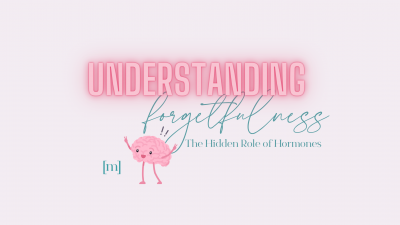Why am I so forgetful?
Do you need help with remembering things? It may be related to your hormones. Many people face forgetfulness, often attributing it to aging, stress, or having too much on their minds. However, hormones might be a lesser-known cause behind those moments of memory lapse.
Hormones and the Brain
Hormones act as the body's chemical messengers, pivotal in regulating various bodily functions, including brain performance and cognitive processes. Essential hormones such as cortisol, estrogen, and thyroid hormones directly influence your memory and cognition. Maintaining hormonal balance is necessary for your brain to function at its peak, ensuring sharp memory and quick cognition.
Common Hormonal Causes of Forgetfulness
- Cortisol and Stress: Chronic stress triggers the release of cortisol, the stress hormone. High cortisol levels over prolonged periods can impair the brain's ability to store and retrieve information, leading to forgetfulness.
- Estrogen Fluctuations: Estrogen significantly impacts brain function, particularly memory. Women may experience memory lapses or forgetfulness during hormonal fluctuation, such as during the menstrual cycle or menopause, when estrogen levels significantly change.
- Thyroid Hormones: Thyroid disorders, either hyperthyroidism or hypothyroidism, can affect cognitive functions. An imbalance in thyroid hormones can lead to memory problems, slowing down or fogging your mental processes.
- Insulin: Insulin resistance, a precursor to type 2 diabetes, can also harm cognitive functions, including memory. This is a growing area of research, highlighting the importance of metabolic health on brain function.
Forgetfulness: Identifying and Addressing Hormones
Recognizing patterns in forgetfulness related to menstrual cycles, stress levels, or other hormone changes can help identify whether hormones contribute to memory challenges.
If you think you have hormone problems, consult a healthcare provider or hormone specialist for a proper diagnosis and treatment plan. Lifestyle changes such as a balanced diet, regular exercise, stress management techniques, and, if recommended, hormone therapy can help balance your hormones and improve memory.
The Hormone-Memory Connection
Hormones such as estrogen, testosterone, thyroid hormones, and cortisol profoundly affect the brain and memory. Estrogen, for example, enhances neural growth and connectivity in areas of the brain associated with memory. Similarly, testosterone has been linked to cognitive functions, including memory. Thyroid hormones regulate metabolism, impacting brain function and memory.
Cortisol, the stress hormone, can impair memory formation when levels are consistently high. An imbalance in these hormones can lead to forgetfulness and foggy thinking.
Tips for Hormone Balance:
- Reduce Stress: Chronic stress elevates cortisol levels, negatively impacting memory. Incorporating stress-reduction techniques such as meditation, yoga, or deep breathing exercises into your daily routine can help manage stress and balance cortisol levels.
- Regular Exercise: Physical activity boosts blood flow to the brain, supporting cognitive functions and hormone regulation. Aim for at least 30 minutes of moderate exercise most days of the week.
- Quality Sleep: Sleep significantly influences hormone production and balance. Establishing a regular sleep schedule and creating a restful environment can improve sleep quality and hormone balance.
Nutritional Thoughts for Supporting Hormone Health:
- Omega-3 Fatty Acids: In fish such as salmon and in flaxseeds, omega-3 fatty acids support brain health and may help regulate hormone production.
- Antioxidant-Rich Foods: Fruits, vegetables, nuts, and seeds are packed with antioxidants that combat inflammation and support overall hormone health.
- Protein and Fiber: A diet rich in lean protein and fiber helps regulate blood sugar levels, crucial for maintaining balanced cortisol and insulin levels.
- Limit Caffeine and Alcohol: Excessive consumption of caffeine and alcohol can disrupt hormone balance. Moderation is key.
Practical Daily Routines:
- Mindfulness and Memory Exercises: Mindfulness or meditation reduces stress and improves memory. Brain exercises such as puzzles, learning a new language, or playing a musical instrument can also enhance cognitive function.
- Hydration: Adequate water intake is essential for overall health and can positively affect brain function and hormone balance.
- Journaling: Keeping a daily journal can help manage stress. It also serves as a tool to track your memory, mood, and any symptoms you may be experiencing. It helps provide insights into your hormone health.
Seeking Professional Help
Understanding the link between hormones and memory is just the beginning. If you're struggling with forgetfulness and think you may have hormone problems, ask a hormone specialist for help.
MedStudio offers a holistic approach to hormone health care, helping men and women feel like themselves again. Our specialists will work with you to identify and address hormonal imbalances, creating a personalized plan that includes lifestyle adjustments, nutritional guidance, and hormone therapy if needed.
Forgetfulness can be frustrating and impact your quality of life. While many factors contribute to memory lapses, hormonal imbalances are a significant yet often overlooked cause. Adopting a holistic approach that includes lifestyle changes, nutritional improvements, and daily practices can support your hormone health and improve your memory.
Remember, you're not alone in this journey. At MedStudio, we're here to support you every step of the way, helping you unlock the secret to improved memory and overall well-being.
Are you ready to take control of your hormone health and improve your memory? Contact MedStudio today to find a hormone specialist near you. Let us help you feel like yourself again.
Serving Patients in the Minneapolis | St Paul area with offices in Minnetonka and Oakdale, MN.

